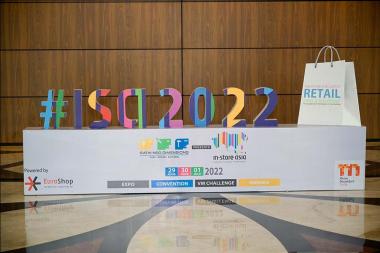In-store Asia presents an industry with a sense of new departures
At the 14th edition more than 4,500 visitors from the retail industry gathered in Mumbai from 1 to 3 June to exchange views on the latest products and solutions specifically for the Indian retail market. Exhibitors on over 7,500 m2 demonstrated where the future of the Indian retail sector is headed. This year's event offered new product segments and profiles, bringing the spotlight to sustainability and focusing on the growth of the overall industry.
The Indian retail market is one of the fastest growing retail markets in the world and a key driver for the Indian economy, something that was also reflected by numerous positive conversations where fruitful synergies were created and long-term relationships were established. Appealing retail design, shopper marketing strategies and visual merchandising were the highlights of the exhibits on the show floor. The trade visitors were also distinguished by a high level of decision-making skills and brand experience expertise.
Thomas Schlitt, Managing Director, Messe Düsseldorf India, points out: “We are very delighted with the brilliant response received from the retail industry for In-store Asia 2023. The event has yet again made its mark by bringing together relevant business opportunities for both exhibitors and visitors. In-store Asia 2023 had something for everyone looking to network and learn from peers and associates in the industry. The event has always been a key meeting point for bellwethers, innovators, distributors, brands and retailers. The 2023 edition has been greatly appreciated for the futuristic ideas and solutions presented both on the expo floor as well as through the dialogues at the convention. I am certain that the connections made here will result in great business prospects for all.”
Elke Moebius, Director Retail & Retail Technology at Messe Düsseldorf, also draws a positive conclusion: “In-store Asia has again confirmed its position as a platform for retail innovations, impressive customer journeys, and shopper-focused strategies that stage physical stores as vibrant, appealing shopping destinations that can captivate and thrill shoppers. Everyone attending here could feel this sense of new departures and investment in the Indian retail sector.”
The 3-day event was accompanied by a Convention under the heading “Humanise, Hybridise, Hyper Localise Retail Experience” where more than 30 speakers delivered talks on such topics as retail research, visual merchandising, shopper marketing and design innovations, to name but a few. Another highlight was the presentation of the coveted VM & RD Retail Design Awards, for which India’s top talents from the Retail Design, Visual Merchandising and Manufacturing sectors competed with each other in 23 distinct categories of store design and window display. At the VM Challenge, six teams of visual merchandisers from renowned brands and companies demonstrated the day before how they conceptualise and realise a shop window within one hour under a given theme and design brief.
Messe Düsseldorf















